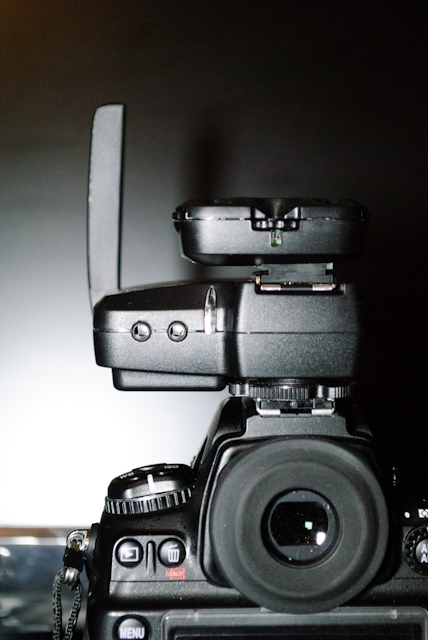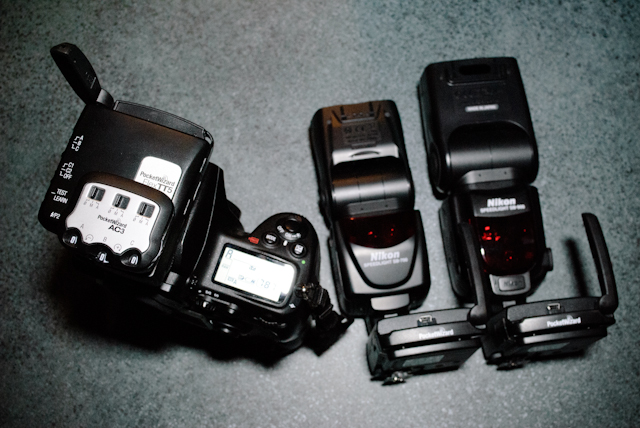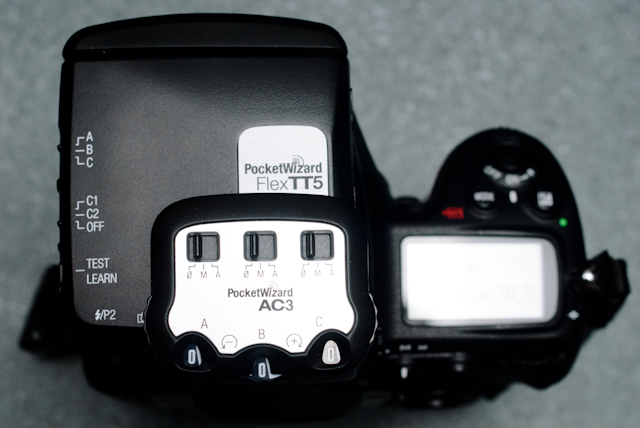If you like this post, help us share it
It is Nikon’s turn… to get some Pocket Wizard love. The Pocket Wizard FlexTT5 and MiniTT1 for Nikon started shipping back in January 2011 and the AC3 zone controller a little later in February. The FlexTT5 is a transceiver workable as a transmitter and receiver in one whereas the MiniTT1 is strictly a transmitter only. One aspect to note is that Pocket Wizard systems utilize different frequencies in different countries (340.00 – 354.00 MHz, US FCC / IC Frequency; 433.42 – 434.42 MHz, CE Frequency), so make sure you choose the right one. The sizes between flexTT5 and MinTT1 are very much different with MiniTT1 about half the size of FlexTT5. Apart from the size, the FlexTT5 has the extra zone selectors (A/B/C) which is used to define the flash group in receiver mode. The FlexTT5 uses the more common type AA batteries whereas the MiniTT1 uses the smaller lithium coin cell type battery. Both TT1 and TT5 have two channel configuration settings C1 and C2. For myself, I picked the FlexTT5 over the MiniTT1 simply because it uses AA batteries which are more convenient. The extra size and weight didn’t bother me at all, compare to the Plus II, the FlexTT5 is consider small.
The new FlexTT5 and MiniTT1 offer TTL operation and High Speed Sync (FP) mode, when combining with Pocket Wizard’s RF triggering, this make perfect automation off-camera flash photography. No more sync cables and line of sight anymore. The units are also compatible with manual flash or mix of TTL flash and manual flash.
To control the power output of the flashes in different zones, you have the option to attach a SU-800, SB-900, SB700 or Pocket Wizard AC3 on top of the camera FlexTT5/MiniTT1. This way you can control the power output of the flashes from the camera position without the need to run around to change the setting at each flash. I would recommend to use the AC3 as it will free up a SB-900/700 and it is much smaller/lighter/cheaper than the SU-800. The AC3 doesn’t need any physical battery, it gets its power from the attachment. The AC3 has three independent zones of flash control. Each zone can be switched OFF/TTL/M independently with a flick of the slider. You can also control up to 6 stops of flash power for each zone in 1/3rd stop increment using the AC3; in TTL mode you can set from +3 to –3 FEC and in M mode you can set from 1/1 – 1/64th power . 1/128th power and below is also possible but you will need to set FEC on the flash to –1.
Both FlexTT5 and MiniTT1 are solidly build. All buttons are clearly laid out, however I am disappointed to see the hot shoe mount is not metal but plastic. The AC3 is extremely small and lightweight, the 0/M/A selectors feel a bit small to me and the hot shoe mount is also made out of plastic.
How to set up the Pocket Wizard FlexTT5, MiniTT1 and AC3?
-
Set up transmitter – Attach the MiniTT1 or FlexTT5 to the hot shoe of the camera. Switch it on by selecting either C1 or C2 channel.
-
Set up receiver – Attach each off camera flash with a FlexTT5 and set them to the same channel as in (2).
-
You can group the flashes by assigning them to either group A/B/C.
-
Set all the off camera flash to “ON”. Do not set them to Remote or Master, even though they are working as remote. The pocket wizard MiniTT1/FlexTT5 “tricks” the off camera flashes as if they are connected to the hot shoe of the camera.
-
If you don’t have any controller attached on top of the camera MiniTT1/FlexTT5 then THAT’s IT, YOU ARE DONE ! You will need to set the power for each flash individually, either TTL or M mode.
-
If you use a SU-800/SB-700/SB-900 as the controller (attach to the camera MiniTT1/FlexTT5) , then set the controller to “MASTER” and then you can adjust the setting for each group. You can set each group to TTL or M. The off camera flash will need to be set to “ON” and TTL mode, even if they are acting as remote and in Manual mode
-
If you use an AC3 as the controller (attach to the camera MiniTT1/FlexTT5) , then you can select the mode of each flash group by the 0/M/A selector and the power output by the dial. The off camera flash will need to be set to “ON” and TTL mode, even if they are acting as remote and in Manual mode.
Here is a picture with the AC3 attached to the FlexTT5.

FlexTT5 and AC3 attached to the camera (left), FlexTT5 attached to the flash (right)


A simple two strobes set up with pocket wizard FlexTT5 and AC3

Here is a simple test that I did with the AC3 zone controller, you can do this using the SU-800/SB_700/SB-900, but probably not as easy. I have attached each SB-700 (Left) and SB-900 (right) with a FlexTT5 and then set them to group A and B respectively.
I then used the AC3 zone controller to control which flash I want to turn on. I have dialled down the flash power to 1/64th which is –3 on the dial of the AC3.
AC3 setting: (group A set to 0, group B to 0 and group C to 0)

AC3 setting: (group A set to M, group B to 0 and group C to 0)

AC3 setting: (group A set to 0, group B to M and group C to 0)

AC3 setting: (group A set to M, group B to M and group C to 0)

Where can I find the equipment seen on this site?
If you find this site useful and planning to purchase any of the equipment seen on this site, please show your support by purchasing your photo equipment at B&H Photo Video, or through any of the affiliate links seen on this site.


